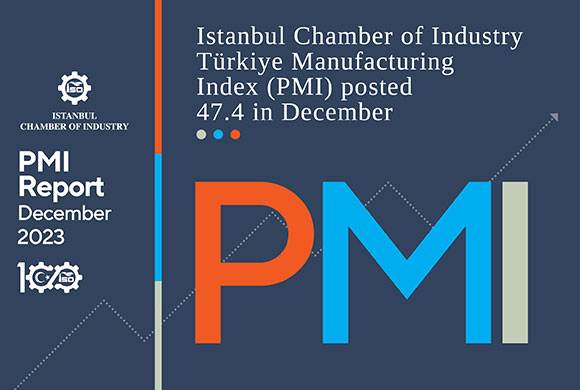News
ICI Released December 2023 Report of ICI Türkiye Manufacturing PMI and Türkiye Sector PMI Report
- 02.01.2024
- News

The Istanbul Chamber of Industry Türkiye Manufacturing PMI ticks up to 47.4 in December of 2023 from 47.2 in November. The index saw the current sequence of moderation extend into a sixth successive month. Slowdown in new orders and scaling back of production continued, but more positively, employment stabilised. Softest rise in input costs since May.
According to the results of the Istanbul Chamber of Industry Türkiye Sector PMI Report, among the monitored sectors, only the food products sector increased its new orders. The sharpest drop in new orders was seen in chemical, plastic and rubber products. And the strongest increase in employment was in land and sea vehicles sector.
The December 2023 survey of Istanbul Chamber of Industry (ICI) Türkiye Manufacturing PMI (Purchasing Managers’ Index), which is the fastest and reliable reference accepted in manufacturing industry performance of the economic growth was released. According to the results of the survey where any figure greater than 50.0 indicates overall improvement of the sector, the headline PMI® ticked up to 47.4 in December from 47.2 in November, but continued to remain below the 50.0 no-change mark.
Manufacturing production eased to a broadly similar degree to the previous survey period, largely as a result of challenging market conditions. A lack of demand was highlighted by further slowdowns in both total new orders and new business from abroad, with firms able to work through backlogs again during the month. Despite moderating workloads, employment stabilised in December, thereby ending a two-month sequence of moderation. Some panellists were keen to expand capacity, but others saw staffing levels ease amid lower new orders and resignations.
Purchasing activity was scaled back, and to the largest extent in four months. As a result, stocks of inputs also moderated. Weak demand for inputs helped suppliers to speed up their deliveries, ending an 11-month sequence of lengthening lead times. Currency weakness, higher wages and increased raw material prices meant that input costs rose again in December, but the rate of inflation eased for the fifth month running. In contrast, output prices increased at the fastest pace since August.
THERE WAS SOME GOOD NEWS FOR THE LABOUR MARKET
Commenting on the Istanbul Chamber of Industry Türkiye Manufacturing PMI survey data, Andrew Harker, Economics Director at S&P Global Market Intelligence, said: "The moderation in the Turkish manufacturing sector seen at the end of 2023 summed up a challenging second half of the year for firms, with subdued demand a key feature. There was some good news for the labour market, however, with firms keen to keep workforce numbers stable heading into the new year.
There were also further signs of cost pressures easing, and although that didn't translate into softer rises in selling prices in December, the potential for a more subdued inflationary environment in 2024 could provide some hope for a demand recovery in the sector.”
NEW ORDERS SLOWED DOWN IN NINE OUT OF TEN SECTORS
Istanbul Chamber of Industry Türkiye Sector PMI report suggested that new orders slowed down in nine out of ten sectors, excluding food sector, in the last month of 2023. The same applies to the output. On a positive note, employment stabilized in December. More than half of the sectors increased their staffing levels. However, cost inflation continued to stay high in general. The only sector increasing its new orders in December was the food products sector for two consecutive months. The sharpest slowdown at the end of the year was in chemical, plastic and rubber products sector. New export orders showed a more positive result compared to total orders with increases in four sectors, primarily in land and sea vehicles sector.
Similarly, only the food products sector remained in the growth zone in output. The most significant loss in output was seen in non-metallic products which had an increase in November. There was moderation in general in both output and new orders in December, but employment stabilized. The number of sectors which increased their staffing levels in December was six from four in November, the highest since May. The sharpest increase in employment was seen in land and sea vehicles sector. And the sharpest drop was in clothing and leather products sector which also had the sharpest drop in work load.
INPUT COSTS CONTINUES TO RISE
Input costs continued to rise rapidly in the majority of sectors with the only exception of chemical, plastic and rubber products, where inflation fell significantly to a seven-month low. Among the ten sectors monitored within the scope of the survey, the fastest increase in input prices was in land and sea vehicles. The fastest increase in sales prices was in the machinery and metal products sector, while the slowest increase was observed in the textile products sector, where companies tried to limit price increases to stimulate demand.
While purchasing activities weakened in almost all sectors in December, the only exception was the food products sector, which slightly increased input purchases. Input stocks increased in only two sectors: food products and machinery and metal products.
*You can find attached the Istanbul Chamber of Industry Türkiye Manufacturing PMI and Sector PMI December 2023 reports.